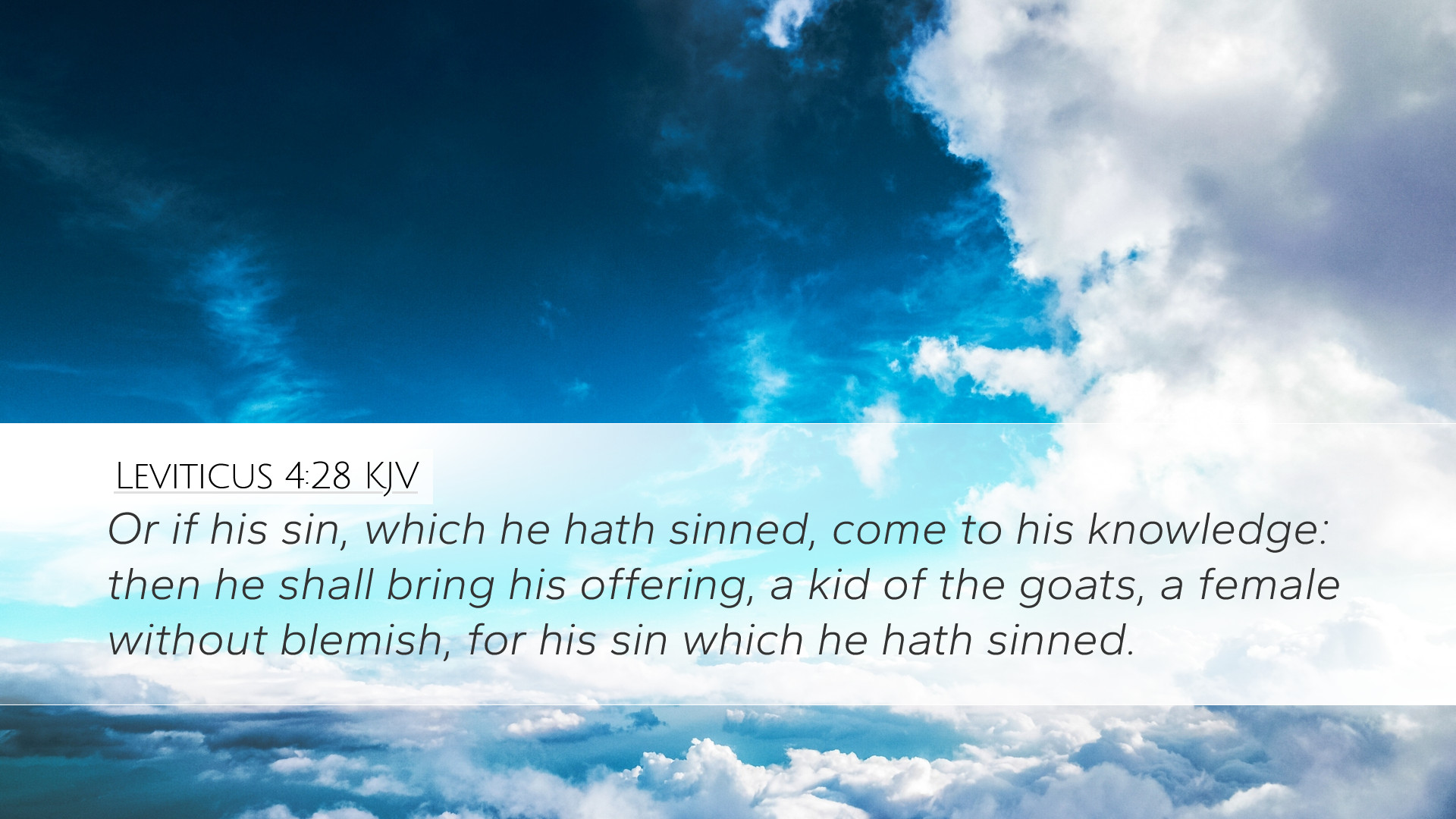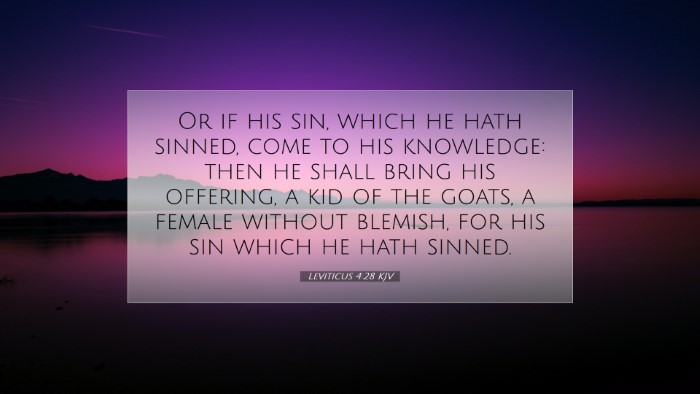Commentary on Leviticus 4:28
Verse: "And if his sin, which he hath sinned, come to his knowledge; then he shall bring his offering, a kid of the goats, a female without blemish, for his sin, which he hath sinned."
Introduction
The verse of Leviticus 4:28 delves into the sacrificial system established for atonement in the Mosaic Law. It highlights the necessity of confession and the prescribed method for atonement when an individual becomes aware of his sin. This moment is vital in understanding the biblical principles of sin, atonement, repentance, and divine justice.
Context and Background
This verse falls within a broader section detailing the various offerings for unintentional sins. Leviticus provides essential guidelines for worship and atonement, particularly for unintentional sacrilege and moral failing.
Historical Context
The Israelites, newly liberated from Egypt, were instructed in the Law as they wandered through the wilderness. The regulations set forth in Leviticus were crucial for maintaining holiness within the community and ensuring proper worship of Yahweh.
Theological Significance
This verse illustrates the principle that realization of sin necessitates a response. The act of bringing a sin offering becomes a profound acknowledgment of one’s failure before God and the community.
Detailed Analysis
Key Elements in the Verse
- Recognition of Sin: The beginning phrase, "if his sin...come to his knowledge," emphasizes the importance of awareness. Genuine repentance starts with the awareness of wrongdoing.
- Offering Specification: The sin offering, a "kid of the goats, a female without blemish," signifies not only the seriousness of sin but also God’s requirement for a pure, unblemished sacrifice. The selection of a female goat suggests humility and a gentler approach in the acknowledgment of sin.
- Sin and Atonement: The act of bringing an offering indicates an understanding that sin disrupts fellowship with God. It reflects a need for atonement to restore that relationship.
Insights from Commentaries
Matthew Henry's Commentary
Henry emphasizes the importance of personal responsibility in recognizing sin. He points out that the sinner must act upon the recognition of sin, reflecting inner contrition. Moreover, he highlights that the offerings signify the necessary restitution to God, stressing that even unintentional sins create a need for atonement.
Albert Barnes' Notes on the Bible
Barnes focuses on the distinction between unintentional sins and willful sins, reinforcing that understanding one's sin is the first step toward atonement. He underscores how the sacrifice serves as a substitute, offering insight into the concept of substitutionary atonement which is fulfilled ultimately in Christ.
Adam Clarke's Commentary
Clarke provides an exploration of the significance of the sin offering within the larger sacrificial system. He notes that the sin offering is a means of recognition and repentance, allowing the sinner to come before God in humility. Clarke also reflects on the nature of the sacrifice, aligning it with the idea that only a perfect offering could atone for sin, pointing towards the New Testament fulfillment of this in Jesus Christ.
Application for Pastors and Theologians
This verse serves as a practical guide for preaching on the themes of sin and repentance. Pastors can use the text to illustrate the importance of self-examination and the reality of human imperfection. In teaching, the application of this verse can prompt a deeper discussion on the nature of God’s grace in providing a means of redemption.
Practical Implications
- Encouragement to Acknowledge Sin: As leaders, facilitating a culture where individuals can openly acknowledge their shortcomings is crucial for spiritual growth.
- Importance of Sacrificial Atonement: Teaching about the significance of sacrifices under the Law can help deepen understanding of Christ’s ultimate sacrifice and the New Covenant.
- Fostering Repentance: Encouraging sincerity in recognizing and confessing sin is vital for maintaining healthy relationships in the community of faith.
Conclusion
Leviticus 4:28 encapsulates profound theological concepts regarding sin and atonement. The commentary reveals the meticulous nature of the Mosaic law's approach to sin and highlights God's gracious provision for reconciliation. In light of Christ’s fulfillment of these sacrificial systems, the verse invites believers to engage sincerely with their relationship with God, acknowledging sin while embracing grace.


